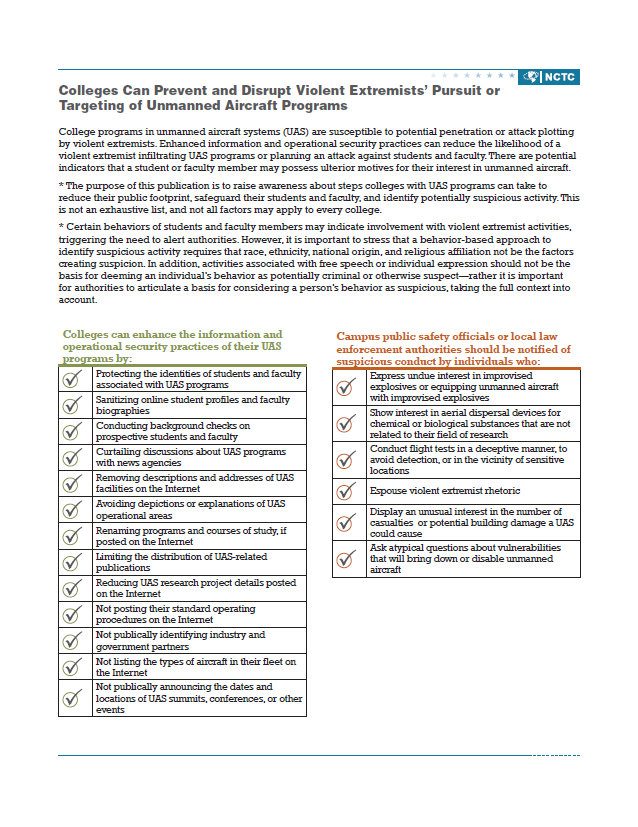Colleges Can Prevent and Disrupt Violent Extremists’ Pursuit or Targeting of Unmanned Aircraft Programs
- 1 page
- July 2012
College programs in unmanned aircraft systems (UAS) are susceptible to potential penetration or attack plotting by violent extremists. Enhanced information and operational security practices can reduce the likelihood of a violent extremist infiltrating UAS programs or planning an attack against students and faculty. There are potential indicators that a student or faculty member may possess ulterior motives for their interest in unmanned aircraft.
* The purpose of this publication is to raise awareness about steps colleges with UAS programs can take to reduce their public footprint, safeguard their students and faculty, and identify potentially suspicious activity. This is not an exhaustive list, and not all factors may apply to every college.
* Certain behaviors of students and faculty members may indicate involvement with violent extremist activities, triggering the need to alert authorities. However, it is important to stress that a behavior-based approach to identify suspicious activity requires that race, ethnicity, national origin, and religious affiliation not be the factors creating suspicion. In addition, activities associated with free speech or individual expression should not be the basis for deeming an individual’s behavior as potentially criminal or otherwise suspect—rather it is important for authorities to articulate a basis for considering a person’s behavior as suspicious, taking the full context into account.
Colleges can enhance the information and operational security practices of their UAS programs by:
- Protecting the identities of students and faculty associated with UAS programs
- Sanitizing online student profiles and faculty biographies
- Conducting background checks on prospective students and faculty
- Curtailing discussions about UAS programs with news agencies
- Removing descriptions and addresses of UAS facilities on the Internet
- Avoiding depictions or explanations of UAS operational areas
- Renaming programs and courses of study, if posted on the Internet
- Limiting the distribution of UAS-related publications
- Reducing UAS research project details posted on the Internet
- Not posting their standard operating procedures on the Internet
- Not publically identifying industry and government partners
- Not listing the types of aircraft in their fleet on the Internet
- Not publically announcing the dates and locations of UAS summits, conferences, or other events
Campus public safety officials or local law enforcement authorities should be notified of suspicious conduct by individuals who:
- Express undue interest in improvised explosives or equipping unmanned aircraft with improvised explosives
- Show interest in aerial dispersal devices for chemical or biological substances that are not related to their field of research
- Conduct flight tests in a deceptive manner, to avoid detection, or in the vicinity of sensitive locations
- Espouse violent extremist rhetoric
- Display an unusual interest in the number of casualties or potential building damage a UAS could cause
- Ask atypical questions about vulnerabilities that will bring down or disable unmanned aircraft

